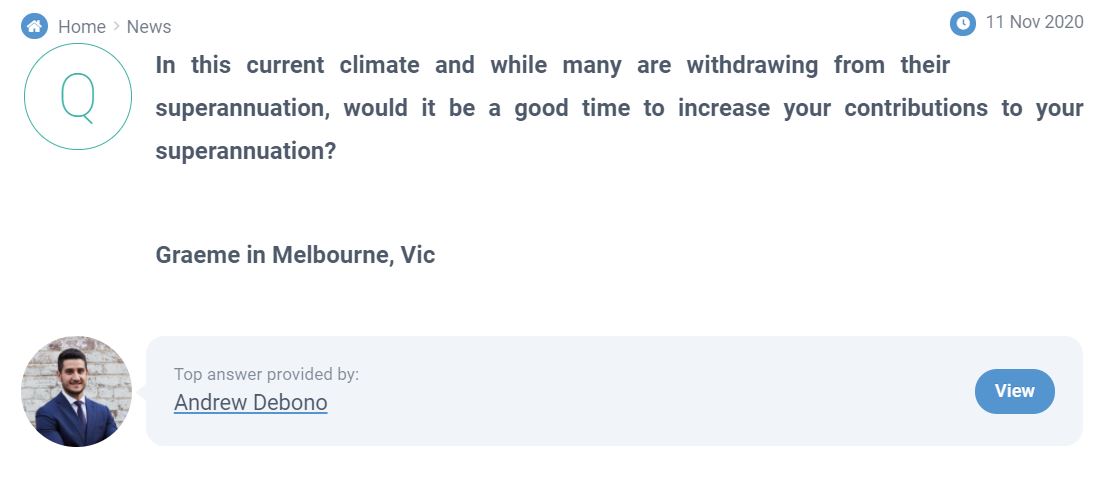Question from Graeme in Melbourne, VIC : In this current climate and while many are withdrawing from their superannuation, would it be a good time to increase your contributions to your superannuation?
Answer by Andrew Debono from our team at Peak Wealth Management shared in Adviser Ratings on 11/11/2020.
Great question, there’s a few key things to consider to answer this question in the best and clearest possible way.
– Cash flow/Budget
– Tax benefits of Superannuation
– Restrictions of Superannuation
– Economic Potential of having more invested over time (time value of money)
First and foremost, this question actually relates back to your personal cash flow or budget. Can you afford to increase your contributions at the expense of having access to less cash? Do you need access to all that cash soon?
The reality is, people don’t care about tax deductions or better returns when there is looming danger in front of them, we know you need to have peace of mind in this before the reality of making perfect financial decisions occurs.
We find financial stress is felt the most from cash flow problems and not having access to a sufficient amount. That’s why we ensure all our clients have a cash buffer in place for emergency times.
If you are confident that you are in a position where you can increase your contributions to the most tax-effective entity available to us .. then here’s what the benefits look like.
Without going too deep into superannuation law, there are two types of ways to contribute to super and here’s how the taxing works:
– Concessional Contributions (CC): which are made from ‘before tax’ income and get taxed in your superfund at 15% (until you reach the annual cap $25k)
– Non-Concessional Contributions (NCC): are made from your ‘after-tax’ income and don’t get taxed in your superfund.
– Tax-deductible contributions and investment earnings 15%
– Capital gains 15% (except if the asset is held for more than 12 months it is only 10%)
– At a certain age and correct strategy it can be 0% (yes, legally)
Example: If you are earning $100,000 per annum you are in the 37% tax bracket. All extra concessional contributions up to the cap are taxed at 15% instead of 37%. Potential savings of 22%.
If that was $10,000 that would be $2,200 tax savings and better off in your super fund and which would be more than likely invested. Great idea to do this over time.
The tax savings come with some restrictions which is why we mentioned your cash flow/access to liquid funds position. You can’t access when you want, you have to meet a condition of release like your 65th birthday, preservation age, incapacity, severe financial hardship, compassionate grounds, terminal medical condition or as of recently COVID-19.
Now finally, the economic impacts of having money invested (the tax-effective benefits are on top of this). I’m going to explain it with relation to property.
If you have the same house that you have always wanted that is on auction, which auction would you prefer to buy at:
1. Sunshine day; perfect temperature; everyone there has a lot of money
2. Severe storm; almost unbearable temperature; people don’t have a lot of money
I know I’d prefer to buy during option number 2, the exact same house will theoretically sell for less (buying a good asset at a discount) on that day than the other day because of a lot of external factors.
So if you increased your contributions to investments and superannuation during covid, that is exactly what you are doing – buying good assets for a cheaper price because of bad current conditions.
Now, that we have gone through all of the above contexts – yes, now is a good time to increase contributions whilst everyone is moving away from it because this will mean there are discounts in front of us.
Buying at a discount means a potentially higher financial gain = more wealth for you in the future.
**Disclaimer - this is not advice, it is general in nature and for education purposes only and does not take into account your personal situation, objective or needs. Before making any decisions you should seek advice from a professional, qualified financial adviser.**


